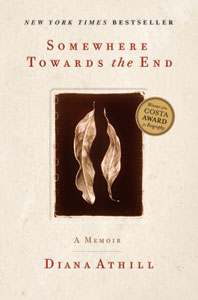Each day leading up to the March 11 announcement of the 2009 NBCC award winners, Critical Mass highlights one of the thirty finalists. Today, NBCC board member Art Winslow discusses autobiography finalist Dian a Athill's Somewhere Towards the End (Norton)
a Athill's Somewhere Towards the End (Norton)
In Somewhere Towards the End, her report from the twilight zone of old age, the British author Diana Athill remarks, “It seems to me that anyone looking back over eighty-nine years ought to see a landscape pockmarked with regrets.” And yet they are few and far between in this memoir (an NBCC finalist in autobiography), and the ones that do appear—a dash of selfishness here, a capitulation to laziness there, shame over coolness toward a cousin’s children—are generally trifling enough to show that Athill takes to heart her own advice to the elderly, “let us not waste our time grizzling.” After all, the slide into pessimism “is very boring and it makes dreary last years even drearier.”
Athill has had the proverbial “interesting life,” fortunate enough in her decades-long career at a publishing house to have edited the work of writers including V.S. Naipaul, Philip Roth, Norman Mailer, John Updike, Simone de Beauvoir, and Jean Rhys. That background, detailed in an earlier memoir, Stet, is reduced to a few fleeting allusions here, as Athill takes up the issue of our extended “falling away” in life. Her clear eye on one’s final years, while stripped of any hint of romanticism, is freighted with optimism despite the stark logic of finality that attends much of what she describes, in which physical deterioration and the inevitability of death often loom large. “Surely the part of life which is within our range, the mere fact of life, is mysterious and exciting enough in itself,” she writes in explaining her atheism, the particulars facing us all perhaps “not exactly comforting, but acceptable because true.”
Athill describes matter-of-factly that by age 43, “I had turned my back with a good deal of relief on romantic love, and I had become so used to not being married that only with difficulty and without enthusiasm could I imagine the alternative.” Recognizing that “being the Other Woman suited me so very well,” she engaged in affairs with married men (was discreet and remains unapologetic) and entered a long-term relationship of cohabitation with the playwright Barry Reckord that has morphed from the sexually romantic to loving friendship to caretaking by her over time, as Barry “has beaten me to physical collapse.”
Noting that within its own framework a life “is amazingly capacious so that it can contain many opposites,” Athill treats us to several of her own. At age 19, left with someone else’s baby momentarily, not only was she unmoved, she realized “this unattractive little creature meant nothing to me.” While she admits to being “much more interested in babies and little children than I used to be,” Athill is convinced she was born with “uncommonly little maternal instinct” and is satisfied with her decision to remain childless. (She came close to dying in a miscarriage in her early forties, in an unplanned pregnancy.)
Much of Somewhere Towards the End emerges as a myth-breaking account that runs against the grain of many received notions of romance, death, obligation and guilt, and the experience of old age, in which “to get through the present” is a paramount concern. In perhaps her most lyrical line—in a book that generally avoids overt lyricism—Athill writes, “We are not just dots at the end of thin black lines projecting into nothingness, but are parts of the broad, many colored river teeming with beginnings, ripenings, decayings, new beginnings—are still parts of it and our dying will be part of it.”
Click here to read the first chapter of Somewhere Towards the End.
Click here to watch Diana Athill talk about Somewhere Towards the End.


